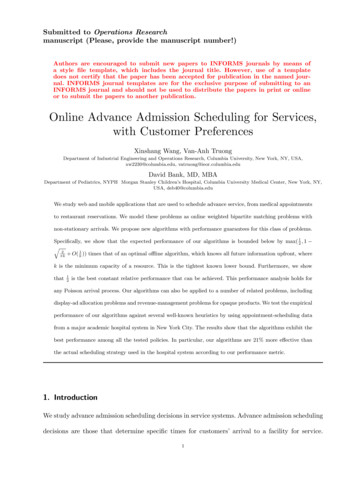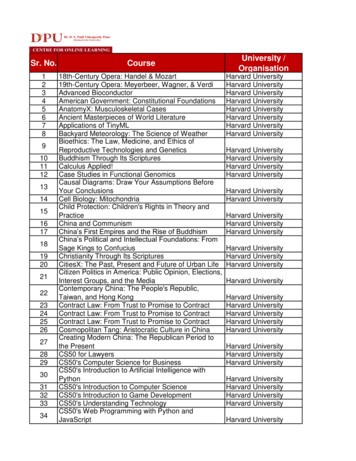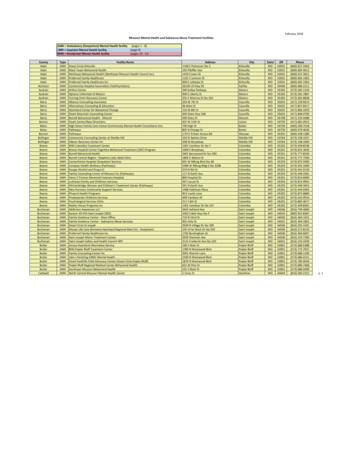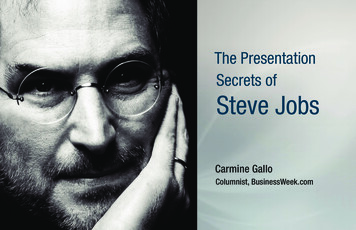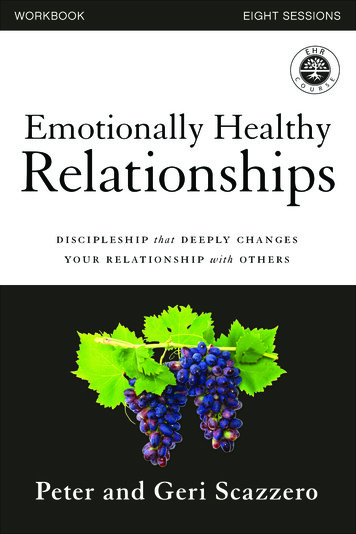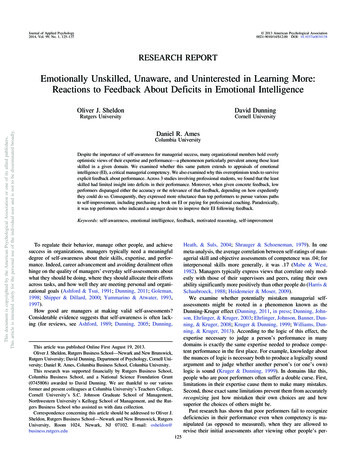
Transcription
Journal of Applied Psychology2014, Vol. 99, No. 1, 125–137 2013 American Psychological Association0021-9010/14/ 12.00 DOI: 10.1037/a0034138RESEARCH REPORTThis document is copyrighted by the American Psychological Association or one of its allied publishers.This article is intended solely for the personal use of the individual user and is not to be disseminated broadly.Emotionally Unskilled, Unaware, and Uninterested in Learning More:Reactions to Feedback About Deficits in Emotional IntelligenceOliver J. SheldonDavid DunningRutgers UniversityCornell UniversityDaniel R. AmesColumbia UniversityDespite the importance of self-awareness for managerial success, many organizational members hold overlyoptimistic views of their expertise and performance—a phenomenon particularly prevalent among those leastskilled in a given domain. We examined whether this same pattern extends to appraisals of emotionalintelligence (EI), a critical managerial competency. We also examined why this overoptimism tends to surviveexplicit feedback about performance. Across 3 studies involving professional students, we found that the leastskilled had limited insight into deficits in their performance. Moreover, when given concrete feedback, lowperformers disparaged either the accuracy or the relevance of that feedback, depending on how expedientlythey could do so. Consequently, they expressed more reluctance than top performers to pursue various pathsto self-improvement, including purchasing a book on EI or paying for professional coaching. Paradoxically,it was top performers who indicated a stronger desire to improve their EI following feedback.Keywords: self-awareness, emotional intelligence, feedback, motivated reasoning, self-improvementHeath, & Suls, 2004; Shrauger & Schoeneman, 1979). In onemeta-analysis, the average correlation between self-ratings of managerial skill and objective assessments of competence was .04; forinterpersonal skills more generally, it was .17 (Mabe & West,1982). Managers typically express views that correlate only modestly with those of their supervisors and peers, rating their ownability significantly more positively than other people do (Harris &Schaubroeck, 1988; Heidemeier & Moser, 2009).We examine whether potentially mistaken managerial selfassessments might be rooted in a phenomenon known as theDunning-Kruger effect (Dunning, 2011, in press; Dunning, Johnson, Ehrlinger, & Kruger, 2003; Ehrlinger, Johnson, Banner, Dunning, & Kruger, 2008; Kruger & Dunning, 1999; Williams, Dunning, & Kruger, 2013). According to the logic of this effect, theexpertise necessary to judge a person’s performance in manydomains is exactly the same expertise needed to produce competent performance in the first place. For example, knowledge aboutthe nuances of logic is necessary both to produce a logically soundargument and to judge whether another person’s (or one’s own)logic is sound (Kruger & Dunning, 1999). In domains like this,people who are poor performers often suffer a double curse. First,limitations in their expertise cause them to make many mistakes.Second, those exact same limitations prevent them from accuratelyrecognizing just how mistaken their own choices are and howsuperior the choices of others might be.Past research has shown that poor performers fail to recognizedeficiencies in their performance even when competency is manipulated (as opposed to measured), when they are allowed torevise their initial assessments after viewing other people’s per-To regulate their behavior, manage other people, and achievesuccess in organizations, managers typically need a meaningfuldegree of self-awareness about their skills, expertise, and performance. Indeed, career advancement and avoiding derailment oftenhinge on the quality of managers’ everyday self-assessments aboutwhat they should be doing, where they should allocate their effortsacross tasks, and how well they are meeting personal and organizational goals (Ashford & Tsui, 1991; Dunning, 2011; Goleman,1998; Shipper & Dillard, 2000; Yammarino & Atwater, 1993,1997).How good are managers at making valid self-assessments?Considerable evidence suggests that self-awareness is often lacking (for reviews, see Ashford, 1989; Dunning, 2005; Dunning,This article was published Online First August 19, 2013.Oliver J. Sheldon, Rutgers Business School—Newark and New Brunswick,Rutgers University; David Dunning, Department of Psychology, Cornell University; Daniel R. Ames, Columbia Business School, Columbia University.This research was supported financially by Rutgers Business School,Columbia Business School, and a National Science Foundation Grant(0745806) awarded to David Dunning. We are thankful to our variousformer and present colleagues at Columbia University’s Teachers College,Cornell University’s S.C. Johnson Graduate School of Management,Northwestern University’s Kellogg School of Management, and the Rutgers Business School who assisted us with data collection.Correspondence concerning this article should be addressed to Oliver J.Sheldon, Rutgers Business School—Newark and New Brunswick, RutgersUniversity, Room 1024, Newark, NJ 07102. E-mail: osheldon@business.rutgers.edu125
This document is copyrighted by the American Psychological Association or one of its allied publishers.This article is intended solely for the personal use of the individual user and is not to be disseminated broadly.126SHELDON, DUNNING, AND AMESformance (Kruger & Dunning, 1999), and when they are paid ormade accountable for accurate self-assessments (Ehrlinger et al.,2008). Such overestimation is observed not only in the lab but inreal world settings, such as with chess players overestimating theirperformance in chess tournaments (Park & Santos-Pinto, 2010),students providing overinflated estimates of their scores on classexams (Dunning et al., 2003), and medical technicians rating theirknowledge in real-world lab procedures (Haun, Zerinque, Leach,& Foley, 2000).To be sure, some critics have argued that because the correlationbetween the perception and the reality of one’s performance isimperfect, and because people tend to overrate their performancesin general, it is a statistical given that poor performers wouldoverrate their competence and achievement (Krueger & Mueller,2002). However, correcting for regression effects due to measurement error (Ehrlinger et al., 2008; Kruger & Dunning, 2002) orfrom floor and ceiling effects (Schlösser, Dunning, Johnson, &Kruger, in press) diminishes the size of the Dunning-Kruger effectonly trivially. In sum, poor performers are often not in a positionto recognize the depths of their deficits, no matter how honestly,impartially, or eagerly they strive for accurate self-assessments.Managers do not appear to be immune: Inaccurate selfassessments are particularly pervasive among poorly performingmanagers (Church, 1997).Herein, we focus on two important, and as of yet unaddressed,questions. The first is whether the Dunning-Kruger effect extendsto social skills such as emotional intelligence. Although there aresome reasons to think emotional intelligence differs from skillspreviously examined for the Dunning-Kruger effect, we make thecase that the effect will nonetheless emerge along this critical skillfor managers and leaders. The second question we examine is howpeople—in particular “unskilled and unaware” managers—react tofeedback about their poor performance. Prior work on theDunning-Kruger effect suggests that the effect persists in the faceof feedback (Ferraro, 2010; Hacker, Bol, Horgan, & Rakow, 2000;Helzer & Dunning, 2012; Simons, 2013). Here, we develop a new“expedient escape” account to explain why that might be so and tospecify conditions under which people instead seek developmentand personal growth. To presage our conclusion, we suggest thattop performers, not low performers, are the ones most willing toinvest in self-improvement after feedback. Low performers, instead, react to feedback by disparaging its credibility, leading themto be less enthusiastic about further self-development. Thus, thepresent article yields the first evidence of the Dunning-Krugereffect in emotional intelligence and sheds new light on how andwhy those most in need of self-improvement and development areoften the least likely to pursue it.Emotional Intelligence and the Dunning-Kruger EffectEmotional intelligence (EI) is a social skill involving the abilityto perceive, understand, manage, and use emotions in interpersonalrelations, including those in the workplace (e.g., Caruso & Salovey, 2004; Fineman, 2004; Goleman, 1998; Mayer, Salovey, &Caruso, 2004). Research has linked EI to quality of decisionmaking (Hess & Bacigalupo, 2011), resilience in the face of stress(Armstrong, Galligan, & Critchley, 2011), and quality of socialrelationships (Lopes et al., 2004). EI has also been linked toimportant managerially relevant outcomes, including enhancedin-role work performance (Brackett, Rivers, & Salovey, 2011;Côté & Miners, 2006; Law, Wong, & Song, 2004), leadershipemergence (Côté, Lopes, Salovey, & Miners, 2010), and perceivedeffectiveness (Janovics & Christiansen, 2002; Kerr, Garvin, Heaton, & Boyle, 2006; Rosete & Ciarrochi, 2005).At present, whether the Dunning-Kruger effect emerges in thedomain of emotional intelligence is an open question. Althoughreplicated across many domains (for a recent review, see Dunning,2011), research on the effect has thus far focused almost exclusively on intellectual abilities, such as logical reasoning or grammar skill, or technical expertise, such as knowledge of firearmsafety or medical lab procedures— domains where the criteria forright answers are well-defined and uncontroversial. It is possiblethat EI, a social ability, shows a different pattern of self-awareness.Given the ongoing task of managing people and dealing withemotions, both their own and those of others, managers likely havenumerous and continual opportunities to observe and confronttheir failures in this domain. As a result, such experiences mightvery well guide them to a clear understanding of their abilities (cf.Sitzmann, Ely, Brown, & Bauer, 2010). Nonetheless, we expectthat the Dunning-Kruger effect will emerge for emotional intelligence, for many of the same reasons it emerges elsewhere—namely, that those who lack emotional intelligence may be limitedin their ability to gauge what effective emotionally intelligentresponses look like.Hypothesis 1 (H1): Self-evaluations of emotional intelligencewill show a Dunning-Kruger pattern, with low performersgrossly overestimating their skill and performance and highperformers, at most, slightly underestimating theirs.Feedback and Expedient EscapeIf those lowest in emotional intelligence substantially overestimate their ability, how might they react when given concretefeedback about their actual lackluster performance? Will suchfeedback serve as a corrective, bolstering their self-awareness andstimulating efforts to self-improve? Or will low performers find away to escape this presumably unwelcome news, resulting in littleor no development? Clearly, it would seem important that lowperforming managers accept negative feedback in order to learnfrom experience, especially early in their careers in order to avoideventual derailment (Shipper & Dillard, 2000). This seems particularly true of feedback about EI (Fineman, 2004). Additionally,prior work in the feedback-seeking literature suggests that whenindividuals fear they are falling short of personal goals, theybecome more positively oriented toward relevant developmentalfeedback, in some cases even proactively seeking it out (Ashford,1986). Consequently, it is plausible that most people, especiallydeveloping managers (i.e., those early on in their careers and stillactively honing their skills), might recognize emotional intelligence as critical to their development and thus show an eagernessto build such skills and address any deficit (Maurer, Weiss, &Barbeite, 2003).However, it is also true that a large body of work suggests thatpeople, including developing managers, react to negative feedbackwith limited receptivity, potentially dismissing the results or finding ways of preserving their self-views (Brett & Atwater, 2001;Halperin, Snyder, Shenkel, & Houston, 1976; Korsgaard, 1996;
This document is copyrighted by the American Psychological Association or one of its allied publishers.This article is intended solely for the personal use of the individual user and is not to be disseminated broadly.REACTIONS TO FEEDBACK ABOUT EMOTIONAL INTELLIGENCESitzmann & Johnson, 2012). Such findings may explain whyfeedback interventions so often fail to have any appreciable effecton recipients’ subsequent motivation or behavior (Kluger & DeNisi, 1996). Indeed, studies in the Dunning-Kruger paradigm inreal world settings suggest that poor performers fail to assimilateany feedback they may receive, rendering predictions about futurebehavior that are no more accurate than those made before feedback (Ferraro, 2010; Hacker et al., 2000; Helzer & Dunning,2012).Building on this latter work, we propose an expedient escapeaccount for how low performers react to feedback. This accountyields a number of specific predictions. First, when people withpositive preexisting self-views are confronted with negative feedback, ego protection concerns may trigger a motivation to “escape”the feedback. Escaping ego-threatening negative feedback couldtake a number of forms. Here, we focus on two. One would be toquestion the accuracy of the feedback (“These scores can’t be true”or “This isn’t a good test of my abilities”). Another would be toquestion the relevance of the domain itself (“The scores may betrue, but this doesn’t matter” or “This attribute is stupid”). Weexpect that low performers may readily take one or both of theseroutes. However, we also expect they will take the most expedientroute, the one more open to motivated interpretation (Ditto &Lopez, 1992). If one route is blocked for some reason (e.g.,because of a prior public commitment to a dimension’s relevance),poor performers may pursue another escape route (e.g., disparaging test accuracy). Thus, the expedient escape account predicts thefollowing effects:Hypothesis 2 (H2): In the wake of feedback, poor performerswho previously thought they were skilled in EI will be mostlikely to derogate the accuracy of their assessment and therelevance of emotional intelligence.Hypothesis 3 (H3): When one escape route (e.g., accuracy) isrestrained from motivated or congenial interpretation for lowperformers, they will pursue the other more open one (e.g.,relevance) in their reactions to feedback.We also argue that the expedient escape account can be extended beyond initial reactions to feedback to attitudes and actionsrelated to personal development. Those who disparage feedback onemotional intelligence are likely to be uninterested in developingtheir skills in this domain, as reflected in their intentions to pursuedevelopment activities aimed at acquiring and practicing skills.This will lead to a paradox. Unskilled-and-unaware low performers are likely to engage in such disparagement and thus be lessinterested in self-improvement. As a consequence, those who maystand to benefit most from developing their emotional intelligenceparadoxically may be least likely to invest in such activity. Thosealready skilled, on the other hand, will be more willing to do so.Thus, we offer two final predictions.Hypothesis 4 (H4): Those who score lower in EI will showless interest in developing their emotional intelligence.Hypothesis (H5): The disparagement of accuracy or relevance,whichever is available or most expedient (i.e., open to interpretation), will mediate the link between performance anddevelopment attitudes.127We recognize, of course, that we are not the first to suggest thatpeople commonly dismiss negative feedback by questioning itsaccuracy or relevance, or that such reactions might make peopleless likely to self-improve (cf. Brett & Atwater, 2001; Maurer etal., 2003). However, to date, theoretical and empirical work onreactions to feedback (e.g., Fedor, 1991; Kinicki, Prussia, Wu, &McKee-Ryan, 2004; Taylor, Fisher, & Ilgen, 1984) has focusedalmost exclusively on information-processing-based explanationsfor feedback acceptance, such as evaluations of the feedbacksource or message. Little research to our knowledge has systematically examined a motivational account for people’s dismissal ofnegative feedback, or directly linked dismissal (be it motivated ornot) to self-improvement motivation.OverviewAcross three studies featuring multiple samples of people completing a well-established measure of EI, we sought the firstevidence that the Dunning-Kruger effect extends to the domain ofEI. We expected that those scoring lowest in emotional intelligence would be the least self-aware (H1). In Studies 2 and 3,participants received feedback about their scores, allowing us toexamine our expedient escape account. We expected that poorperformers would derogate the accuracy of the measure and relevance of emotional intelligence (H2). If either of these routes wasblocked, they would derogate the other (H3). This would allowthem to preserve their positive self-views. Finally, we examinedattitudes and actual choices involving development, expecting thatparticipants scoring lowest would paradoxically be least interestedin developing their emotional intelligence skills (H4). This effectwould be at least partly mediated by their “escape” through derogating accuracy or relevance (H5). Thus, these studies hold thepotential to shed new light on the dynamics of emotional intelligence, the scope of the Dunning-Kruger effect, the motivated waysin which people escape unwanted feedback, and exactly who ismotivated toward self-development.Method for Studies 1, 2, and 3ParticipantsStudy 1 participants were 157 masters students (62% female)enrolled in two separate masters-level classes at two large Northeastern universities. They ranged in age from 21– 40 years old(M 29), averaging approximately 5 years of post-undergraduatework experience. Showing no significant differences, we collapsedour analyses in Study 1 across both groups. Study 2 participantswere 66 Masters of Business Administration (MBA) students(45% female) enrolled in a management course on organizationalbehavior at a large Midwestern university, ranging in age from25– 45 years old (M 30), with an average of 7 years of postundergraduate work experience. Study 3 participants were 157MBA students enrolled in a management course in organizationalbehavior at a large Northeastern university. Sixteen were excludedfrom analyses, due to clear protocol violations ranging from notcompleting key components of the study to misreading the objective feedback. This left a sample of 141 MBA students (35%female). These participants ranged in age from 23– 63 (M 29),with an average of 6 years of post-undergraduate work experience.
SHELDON, DUNNING, AND AMES128This document is copyrighted by the American Psychological Association or one of its allied publishers.This article is intended solely for the personal use of the individual user and is not to be disseminated broadly.Common Materials and ProcedureIn all studies, participants first completed the Mayer-SaloveyCaruso Emotional Intelligence Test (MSCEIT; Mayer, Salovey,Caruso, & Sitarenios, 2003), introduced as one of the most wellvalidated and widely used EI tests used by numerous Fortune 500companies and large organizations for training and development purposes. Participants received an extensive description of EI, as conceptualized by Mayer, Salovey, and Caruso (2008), and indicatedtheir percentile ranking among U.S. adults in EI on a scale rangingfrom 0 to 100, as well as where they believed their specific score onthe MSCEIT they had just completed would place them. Next, participants answered similar percentile questions for each of theMSCEIT’s four specific subcomponents: perceiving emotions in theself and others, using emotions to facilitate thought, understandingemotions, and managing their own and others’ emotions.Feedback and Interest in DevelopmentStudy 2 added two unique elements. First, after taking theMSCEIT and completing our self-evaluation measures, participants actually learned how they fared on the test. We then administered a post-feedback questionnaire asking participants to assessthe MSCEIT’s accuracy from 1 Not at all to 7 Extremely,adapted from Brett and Atwater (2001). In doing so, we also providedparticipants with an actual self-improvement opportunity—a chanceto purchase, at a discount, a book titled The Emotionally IntelligentManager (Caruso & Salovey, 2004) by two eminent scholarsknown for their work on EI. If participants indicated they wantedto buy the book, the experimenter followed up a week later tocollect payment in exchange for it.In Study 3, we included the same general elements as Study 2,but expanded the design in two ways. First, before completing theMSCEIT, participants were randomly assigned to rate either theexpected accuracy of the upcoming test (Accuracy Restraint Condition) or the relevance of EI to their future work and socialsuccess (Relevance Restraint Condition). In the Accuracy Restraint condition, participants indicated (1 Not at all, 7 Verymuch so) the extent to which they anticipated that the MSCEIT, asa test, would accurately capture their true overall emotionalintelligence, as well as the extent to which they anticipated trusting, believing, and seeing as accurate feedback they would receivefrom the test’s publisher ( .90). In the Relevance Restraintcondition, participants instead rated the extent to which they believed that having high EI would contribute to their future jobperformance, career success, social success, and success in lifemore generally, with items based on Noe & Wilk’s (1993) tripartite classification of perceived benefits associated with developmental tools and activities ( .86). In both conditions, participants’ average responses across all rated items were positiverelative to the scale neutral midpoint, Ms 5.16 and 6.35 foraccuracy and relevance, respectively ts(64) 28.20 and 10.74,ps .001, evidencing clear commitment to the variable rated.Second, we revised the “post-feedback” questionnaire fromStudy 2, adding several new measures and items. We began byasking participants to rate their overall EI again in percentile terms,now that they had actually received feedback on it. We thenassessed the extent to which participants viewed the MSCEIT asan accurate measure of their abilities and saw EI in general asrelevant to their future success. Because of time constraints, weemployed slightly abbreviated versions of these measures. Specifically, participants rated the degree to which they saw their testresults and feedback as accurate, believable, and trustworthy ( .96). They assessed post-feedback relevance by indicating theextent to which they viewed EI as relevant to their future careersuccess and social success in life ( .88).Finally, using a few adapted items from previous work on learningand development intentions (Hurtz & Williams, 2009; Maurer et al.,2003), we assessed intentions to improve EI by asking participants toreport the extent to which they personally intended to improve their EIon one or more of the four EI subscales, and the extent to which theyplanned to seek out additional feedback, suggestions, or input onimproving their EI abilities from peers or close others (1 Not at all,7 Extremely; .84). Participants also expressed their willingnessto pay (in U.S. dollars; Foreit & Foreit, 2003; O’Brien & Viramontes,1994) for each of three developmental activities: the same book on EIoffered to participants in Study 2, individual coaching from an expertEI-trainer, and a half-day of group training on EI and leadership witha similarly expert EI-trainer. For the last two items, we indicated thatthe professional coach in question was an employee of TalentSmart.com, a firm describing itself as the world’s leading provider ofemotional intelligence-related products and services, with 75% ofFortune 500 companies as clients. The prices participants cited wereheavily skewed. Thus, we subjected these prices to a log transform ontheir price plus 1. We then combined the three items to create asingle willingness-to-pay (WTP) for development scale ( .85).ResultsMeans, standard deviations, and correlations among variablesfor each of our three studies are included in Tables 1, 2, and 3.Table 1Means, Standard Deviations, and Correlations From Study 1Variable1.2.3.4.5.Actual EIEstimated EIEstimated MSCEIT Est. EI–Act. EI Est. MSCEIT–Act. EI .4621.63—.20ⴱⴱ.23ⴱⴱⴱ .83ⴱⴱⴱ �—.18ⴱⴱ.26ⴱⴱⴱ—.94ⴱⴱⴱ—Note. N 157. EI emotional intelligence; Est. estimated; Act. actual; MSCEIT Mayer-SaloveyCaruso Emotional Intelligence Test.ⴱⴱp .05. ⴱⴱⴱ p .01.
REACTIONS TO FEEDBACK ABOUT EMOTIONAL INTELLIGENCE129Table 2Means, Standard Deviations, and Correlations From Study 2Variable1.2.3.4.5.6.7.Actual overall EIEstimated EIEstimated MSCEITTest accuracyInterest in book Est. EI–Act. EI Est. MSCEIT–Act. EI ⴱ .87ⴱⴱⴱ .80ⴱⴱⴱ2—.80ⴱⴱⴱ .05.10.23ⴱ.193— .01.09.30ⴱⴱ.29ⴱⴱ4567—.36ⴱⴱⴱ .42ⴱⴱⴱ .32ⴱⴱ— .26ⴱⴱ .27ⴱⴱ—.94ⴱⴱⴱ—This document is copyrighted by the American Psychological Association or one of its allied publishers.This article is intended solely for the personal use of the individual user and is not to be disseminated broadly.Note. N 166. EI emotional intelligence; Est. estimated; Act. actual; MSCEIT Mayer-Salovey-Caruso Emotional Intelligence Test.ⴱⴱp .05. ⴱⴱⴱ p .01.Gender failed to qualify any of the results of any of our threestudies.Before examining our hypotheses, we considered a more basicquestion: How accurate were people in their self-assessments ofemotional intelligence? Participants in all three studies overestimated their EI relative to objective performance. On averageacross studies, participants placed themselves in the 77th percentile among U.S. adults, exceeding their actual average performance(41st) by roughly 36 percentile points, all paired ts 9.83, p .0001. They also overestimated their specific test score, predicting,on average, that their test score fell in the 74th percentile, all pairedts 7.64, p .0001. Such overestimation occurred even thoughparticipants’ self-ratings possessed a marginal correlation withactual performance aggregated across studies, average r .09, z 1.65, p .10 and average r .09, z 1.86, p .07, forperceptions of EI and specific MSCEIT performance, respectively.This degree of correlation, albeit low, is consistent with that foundin past research (Brackett & Salovey, 2006).The Dunning-Kruger Effect in Self-AssessmentsTurning to H1, we found, as predicted, that participants lowestin emotional intelligence vastly overestimated their ability andperformance on the MSCEIT. Figure 1 displays the relationshipbetween actual performance and overestimation of skill as measured by self-ratings of EI (left panel) and perceived performanceon the MSCEIT (right panel). Overestimation skyrocketed as performance worsened, as evidenced in regression analyses, lookingfor both linear and quadratic trends, predicting overestimationfrom actual performance, all linear bs .69 and .86, ps .0001, for EI self-rating and MSCEIT score estimate, respectively.For instance, the analysis showed that participants performing atthe 10th percentile overestimated their EI by roughly 63 to 69percentile points, depending on the study, and their MSCEITperformance by 62 to 63 points. Top performers, on the other hand,were relatively much more accurate. They underestimated theirskill and performance, but Figure 1 reveals, for example, thatparticipants at the 90th percentile did so by only 5 to 20 points forboth perceptions of EI and MSCEIT performance. No quadratictrends arose, save for overestimation of EI after receiving feedbackin Study 3, .15, p .05. This trend emerged (see Figure 1)because high performers typically corrected almost all of theirself-underestimation after feedback, whereas low performers corrected only a fraction of their overestimation.1As hinted at earlier, a critic might label these results as merestatistical artifact, namely, regression to the mean plus a heftyoverall overestimation of self (Krueger & Mueller, 2002). Furtheranalyses, however, spoke against such an account. Instead oflooking at over/underestimation, we next examined the absolutedeviation between performance estimates and actual performance—that is, how much each participant’s estimates differed,regardless of direction, from actual performance. Figure 2 depictsthose absolute deviations as a function of actual performance. Viaregression analyses, we investigated any linear and quadratic relationships between the two. In each analysis, we found significantlinear, all s .85, ps .0001, and quadratic trends, all s .11, ps .02, such that increases in accuracy emerged as actualperformance improved, but that this improvement slowed at highlevels of performance.At first glance, such a slowing improvement of accuracy at thetop might be taken as evidence of regression to the mean: If topperformers are consistently underestimating their performances,then they would show more consistent gaps between perceived andactual performance, causing a quadratic trend in our analysis.However, a close examination of Figure 2 argues against such aninterpretation. At the 99th percentile, the top of the scale, theoverall slope of the relationship between actual performance andaccuracy (as assessed by the deviation measure) is still improving—and significantly so when data were c
that the Dunning-Kruger effect will emerge for emotional intelli-gence, for many of the same reasons it emerges elsewhere— namely, that those who lack emotional intelligence may be limited in their ability to gauge what effective emotionally intelligent responses look like. Hypothesis 1 (H1): Self-evaluations of emotional intelligence
